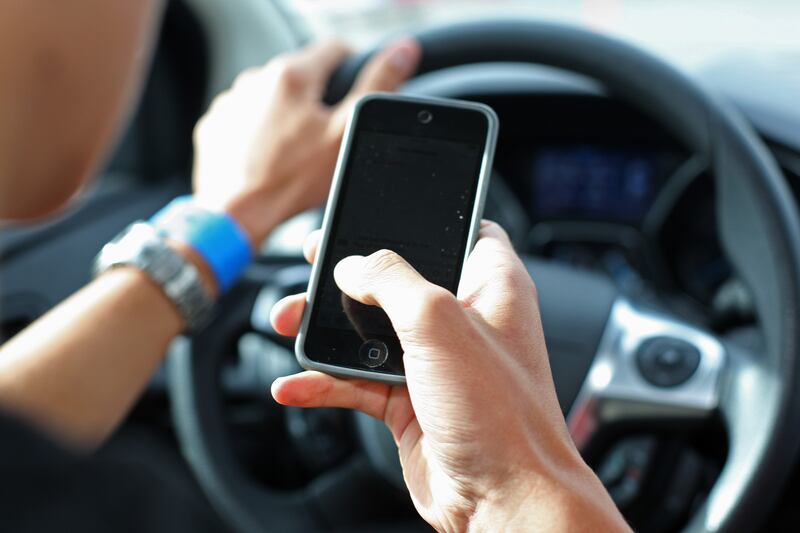SALT LAKE CITY — A bill to toughen Utah’s distracted driving laws by letting police cite people for holding a cellphone while driving never made it out of committee.
“The bill simplifies for officers, that if the individual is actually holding the phone, we have the ability to cite for distracted driving,” Park City Police Chief Wade Carpenter told the House Government Operations Committee on Tuesday.
“Right now we struggle with the way the current statute is written. ... It’s nearly impossible for us to enforce. The driver either has to admit to actually texting, talking or manipulating their phone while driving, or we have to prove what they were doing,” he said.
HB160, sponsored by Rep. Carol Spackman-Moss, D-Holladay, created new restrictions on the use of handheld electronic devices while driving, prohibiting a driver from handling a cellphone while the vehicle is in motion.
It would also have reduced the penalties from the original class C misdemeanor and an automatic $100 fine to just an infraction and a $75 fine for the first offense. Both the current law and the bill makes it a class B misdemeanor if the person causes serious injury as a result of their actions.
The bill was returned to the House Rules Committee, which could assign it to another committee.
Spackman-Moss presented an almost identical bill in the 2020 legislative session, but HB101 ran out of time to be discussed in the Senate before the session ended.
Utah’s current driving laws
Current law allows the use of a handheld device or cellphone when making voice calls and viewing GPS, but prohibits the dialing of a phone number, texting or instant messaging, viewing or recording a video or entering data. Exceptions are only for medical emergencies, reporting a crime or safety hazards.
Spackman-Moss said she had worked with law enforcement in crafting the bill and explained its intent was to tighten up laws to allow officers a better definition of when a violation has occurred with a cellphone and when it has not.
“If there’s one thing that this change does, it sends a clear message, you should not have your phone in your hand while you’re trying to operate a vehicle,” said Utah Highway Patrol Col. Michael Rapich.
Rep. Phil Lyman, R-Blanding, said that he knows Utah already has laws for reckless and negligent driving and said he “struggled” to see why they needed more legislation that was already “covered by a broad rule.”
Rapich said that even though UHP roughly stops about 2,500 drivers a year for distracted driving, the officers have a hard time “conclusively confirming” what the driver is doing with the phone in their hand.
“With the distracted driving laws as they are, we can’t stop someone for having the phone in their hand,” Rapich said.
Rapich said about 25,000 crashes “have been confirmed attributed to distracted driving” in the last five year, causing 90 deaths and 10,000 injuries. He said cellphones were pinpointed in half those accidents.
Leslee Henson Rasmussen, of Sandy, told the committee she was in an accident involving a distracted driver that killed her husband.
“More and more laws have been passed lately concerning drunk driving. When in reality, texting while driving has been proven to be six times more dangerous than driving drunk; six times more deadly,” she said.
Connor Boyack, executive director of the Libertas Institute, argued the bill would change nothing.
“The sad stories that exist in this domain are very heart-wrenching, and rightly so, but they’re used often to suggest that the problem would go away, that there would be no future accidents and fatalities if this bill were to pass,” he said. “People who want to use their cellphones are going to continue to do so just as they have in the wake of the past bill; where now people use their cellphones in their laps.”
Rep. Michael Petersen, R-North Logan, was against possible expansion of the the hands-free specification of the bill.
“I just worry that I’m going to be restricted from holding a hamburger or holding a soda, holding my wife’s hand; so, I just don’t know where this ends,” he said.
Rep. Norm Thurston, R-Provo, said he was conflicted about the lawful difference between words “use and manually manipulate” of a cellphone and how it was any different from what current statute said. He was also concerned about the bill being similar to what Spackman-Moss ran last year, saying she had the ability to address opposing concerns but didn’t.
“None of our concerns have been addressed. No conversations have been had. We have not been consulted. We have been not listened to. We maybe could have come with something that we could agree on,” he said.
Rep. Steve Waldrip, R-Eden, wanted the bill to go to the House for debate.
“I think the best description I can give our job here is we arbitrate between individual rights and the rights of society or the rights of others. And I think that’s best exemplified by the, by the notion of your right to punch stops where my nose begins, you can punch in the air all you want, once my nose gets in the way, your right to punch just ended.”

